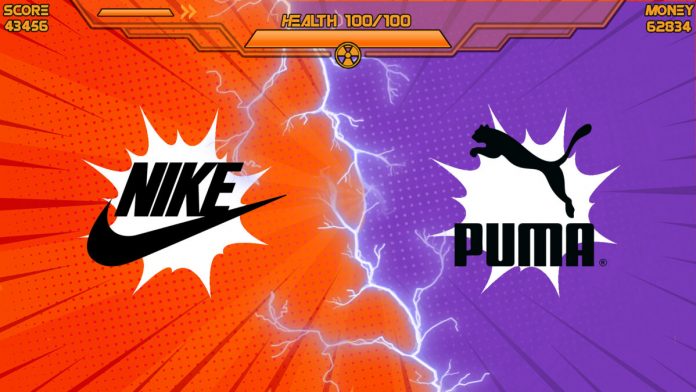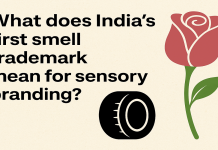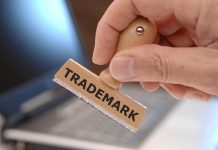This article is written by Kinjal Keya, pursuing a Diploma in Intellectual Property, Media and Entertainment Laws from LawSikho.com.
Table of Contents
Introduction
The Portland-based footwear brand “Nike” has been innovatively reshaping the sportswear and footwear industry ever since it came into the market for business. It has been actively and creatively contributing to the sportswear industry by not limiting itself just to apparel and footwear but with technologically advanced types of equipment and gadgets. The current article talks about the controversy pertaining to one such innovation by Nike- “Smart Shoes”, self-lacing sneakers, and ones that can be tightened or loosened via a smartphone. The company applied to register “FOOTWARE” as a trademark which was opposed by Puma. This article will be talking about the controversy between Puma and Nike and the author will be analyzing the judgment with the help of Indian judicial precedents. 
The controversy involving Nike and Puma
Nike applied to register the term “FOOTWARE” as a trademark, not covering sports shoes but the Internet of Things (IoT) covered under classes 9, 38, and 42 of nice classification at the UK Intellectual Property Office (UKIPO). These classes include computer software and hardware, telecommunications services, and cloud computing services. Puma SE, its competitor and another leading brand in the sportswear and footwear industry opposed this move by applying on the basis of Sections 3(1)(b), 3(1)(c), and 3(1)(d) of the UK Trade Marks Act 1994 because:-
- This mark is an ordinary, descriptive expression for footwear and it does not have sufficient distinctiveness as it is an obvious combination of “footwear” and “software”. Thus, it does not serve as a badge of origin for the goods and services for which registration was sought.
- The mark is descriptive as it simply informs that it is hardware/software for afoot.
- The mark is a common descriptor as it is now customary in this trade and has already been used by several users.
Puma also filed evidence stating that they were the first company to invent shoes that were technologically advanced and it was referred to as footwear which has software in several articles. However, The court dismissed this evidence stating that these articles did not actually contain the term “FOOTWARE.”
The court observed that “WARE” is not descriptive with respect to Class 9 goods as the term ‘foot” can’t be describing any good or Class 42 as the term ‘ware’ cannot be understood as ‘software’ or ‘hardware’. There wasn’t enough evidence with the court that might prove that the term “FOOTWARE” has become customary in the trade. Therefore, keeping these points in view, the Court granted the trademark “FOOTWARE” to Nike and dismissed the case.
“Footware” trademark: analysis with respect to previous judgments
The dispute over the term “FOOTWARE” is related to the concept of descriptive and generic trademarks i.e. those trademarks that are used to denote the domain of the commodity and service with which the product is associated. Descriptive names are not allowed to be registered as they are a common epithet and lack the essential requisite of distinctiveness; they cannot be monopolised by one particular trading establishment and are subject to common usage by the public at large.
Having a look at the present scenario
In the present scenario, Puma objected against Nike’s claim for recognition of “FOOTWARE” as a trademark as it stated that the term is an ordinary descriptive term used for goods and services in the industry, especially used to descriptively refer to tech-shoes that involve hardware/software. However, Nike refuted the objection by describing ‘footware’ to be specifically connected with tech-driven sneakers and to be used in facilitating users to interconnect with other smart devices for the purpose of monitoring and managing automated systems.
The ambit of descriptive terms varies according to the facts involved in the case and the expression for which the protection is being claimed. The essential condition on which the courts have relied upon to ascertain the question of descriptiveness is by analysing the sense for which the expression was used and the consequential effect that it has upon the consumer base of that particular sector of goods and services. The recent judicial practice in the context of countries like the United Kingdom emphasises that the assessment of a descriptive term must be done generously and only those words that describe the essential characteristics of the product shall be considered as descriptive terms rather than an extensively interpreting it to be associated with all vague and simple terms connected to the good or service.
Judicial precedents in India with respect to generic trademarks
In the Indian context, Section 9(1)(b) of the Trademark Act, 1999 addresses the issue of descriptive marks, it outrightly prohibits the registration of such descriptive words or phrases as trademarks. Additionally, this statutory provision also bars the registration of such trademarks that have turned out to be standard or customary in the present language with reference to a sector of goods and services.
- Recently, in Sassoon Fab International (P) Ltd. v. Sanjay Garg, deciding whether N95 mask is capable of being protected as a trademark stated that a “generic expression can never be granted registration and/or protection as a trademark under the trademark laws.” It stated that N95 is a generic and descriptive term that determines the type and quality of good; the term ‘95’ in this term clearly shows that it filters 95% of the germs in the air. However, in Nike v. Puma, Nike was granted the trademark in spite of it being descriptive.
- Similarly, Delhi High Court in the case of Delhivery Pvt. Ltd. v. Treasure Vase Ventures Pvt. Ltd., held that “DELHIVERY”, a courier service company, being phonetically similar to the English word ‘delivery’ is a generic word. The plaintiffs, in this case, argued that “DELHIVERY” is a combination of ‘Delhi’ and ‘Very’ and thus, it is not a generic term. However, the court rejected this argument stating that not only is it phonetically similar to ‘delivery’ it also describes the nature of service the company would be providing- i.e. delivery or courier services.
- Moreover, in Nestle’s Products (India) Ltd. v. P. Thankaraja, in the question of whether the term ÏNSTEA” can be granted trademark or not, the Madras HC held that “the term has the tendency to monopolize all manufactured tea which goes by the generic description of ‘instant tea’ or ‘instantaneous tea’. To grant registration to this word-mark, would therefore make its owner a monopolist of a part of the ordinary vocabulary in which traders transact business with themselves and their customers.” In the issue at hand, Nike by registering “FOOTWARE” may potentially monopolize tech- shoes i.e. technologically advanced shoes thereby restricting other brands to enter the domain.
- In J. R. Kapoor vs. Micronix India, the court held that the term “micro” cannot be granted trademark as it was descriptive of the products which were formed using some technology, and because it’s a common English word, no one can claim exclusive right over it. However, even though the terms foot and ware were descriptive and a common English word, it was granted a trademark.
Additionally, in order to be registered as a trademark, the term “FOOTWARE” should have acquired a secondary significance. The term “FOOTWARE” serves as a clear indicator of the goods and services it will deal with. It is very clear that the term talks about footwear that has technology infused with it. The registration of such marks is unfair and it has been held so with various judicial pronouncements. However, The United Kingdom’s court granted the trademark.
Conclusion
If an author contends that UKIPO has unfairly granted a trademark to the term “FOOTWARE” to Nike. It has failed to take into consideration that this term is a generic term that can’t be registered under the trademark law. The purpose of discouraging the usage of generic or descriptive words by restricting them from being registered as trademarks is aimed at safeguarding the concept of product distinctiveness. Unregulated registration of descriptive words as trademarks will enable a single producer to monopolise a whole sector of goods and services and prohibit new entrants in that sector thereby effectively eliminating all kinds of competition. Such a practice poses a great threat to product diversity as it ensures a free run for the company that gets the trademark for descriptive words and also decreases the bargaining power of the consumer base by limiting the overall number of functionaries in that sector of goods and services.
In this case, The UKIPO fails to take into consideration that the term “FOOTWARE” may seem like a misspelling of the term footwear which is actually good for which the trademark is sought. It also fails to take into consideration that this term is phonetically similar to footwear. It is a very common practice where the words are misspelled but are phonetically similar to the good or service for which the trademark is sought, an example being the Dehlivery case.
Granting the trademark to Nike Innovate CV by the UKIPO is an unfair decision and it must be reviewed as the court has failed to take several principles and judicial precedents of trademark law into consideration.
References
- UK: Descriptive Trade Marks – A Question of Degree By Lindsey Wrenn, available at https://www.mondaq.com/uk/eu-law/32049/descriptive-trade-marks–a-question-of-degree
LawSikho has created a telegram group for exchanging legal knowledge, referrals, and various opportunities. You can click on this link and join:
https://t.me/joinchat/J_0YrBa4IBSHdpuTfQO_sA
Follow us on Instagram and subscribe to our YouTube channel for more amazing legal content.
 Serato DJ Crack 2025Serato DJ PRO Crack
Serato DJ Crack 2025Serato DJ PRO Crack










 Allow notifications
Allow notifications


